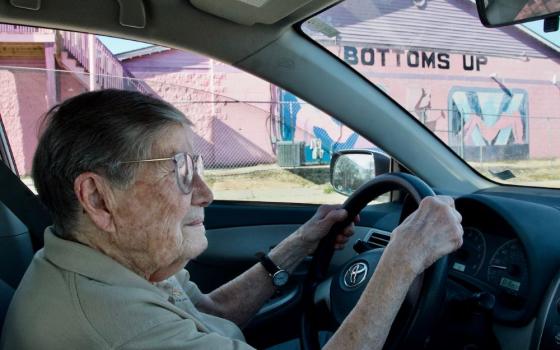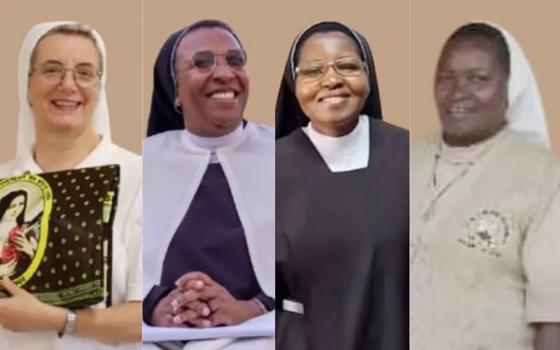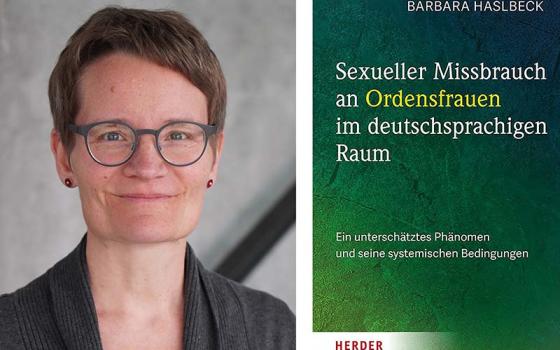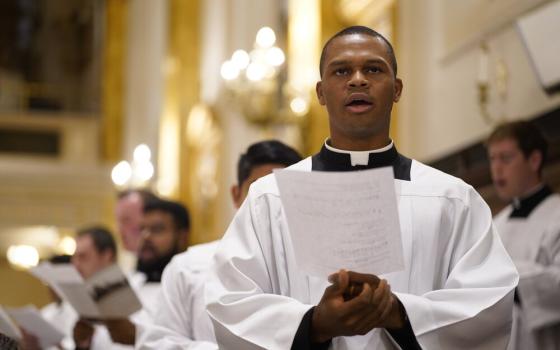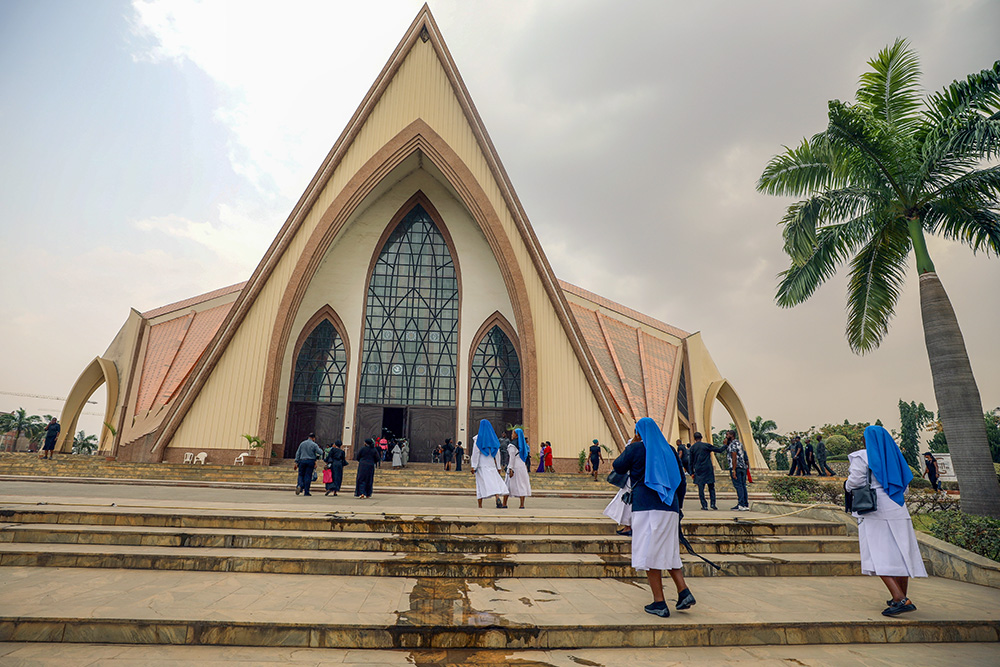
Women religious are pictured in a file photo entering a church in Abuja, Nigeria. (OSV News/Reuters/Afolabi Sotunde)
I recently served as the pioneer coordinator of All Africa Conference: Sister to Sister from September 2012 to September 2024. All Africa Conference: Sister to Sister is an organization founded in 2000 to help African women religious respond to the ravaging effects of HIV and AIDS in sub-Saharan Africa.
By the end of my graduate studies in 2011, my discernment led me to consider ministries connected to Africa, with religious women and youth as the target groups. During my graduate studies, two opportunities influenced my discernment to say yes to accompanying women religious in Nigeria on their journey of witnessing and responding with faith in the era of HIV/AIDS resurgence.
The first was an invitation to participate in a yearlong intercongregational leadership program, and the second, toward the end of my studies, was an opportunity to participate in "Walking in the Footsteps of Gandhi," an experience that involved traveling to all the places in India that were formative to Mohandas Gandhi's emergence.
A member of our congregation was accompanying me during my discernment. She encouraged me to do a yearlong internship with All Africa Conference: Sister to Sister to help clarify my call to minister in Africa. At that time, the organization was in the middle of preparations to travel to Uganda for a biannual international conference. I was invited to travel with the organization, so that I would gain firsthand experience of how it worked and decide if I still wanted to intern with it.
At the time, All Africa Conference: Sister to Sister in Nigeria had collapsed as an organization. It had exhausted every avenue to revive, but had been unsuccessful. During the international conference, delegates asked if I would help reintroduce and revive All Africa Conference: Sister to Sister programs in Nigeria, bringing sisters from more than 50 congregations together. I traveled to Nigeria two months after the conference.
My role began with an address to the National Conference of Women Religious in January 2013 in Abuja, Nigeria. I explained the vision and mission of All Africa Conference: Sister to Sister, how the organization could help, encouraged the major superiors not to relent in the face of the resurgence of an HIV pandemic, and asked the question: What were the sisters ready to do to reintroduce All Africa Conference: Sister to Sister to Nigeria?
Advertisement
Nigeria, with its large population of religious women and religious congregations spread across vast geopolitical zones, brings unique challenges and untapped creativity that are capable of renewing the church and society. As such, All Africa Conference: Sister to Sister recognized that with adequate training and support, Nigerian women religious can respond more effectively and devise solutions to their challenges.
However, a lack of leadership was and remains a challenge. As religious women, we recognize that we are not immune to the ills of our society because we are a product of it. Nevertheless, our people yearn for leadership that leads by example, serves and is accountable and compassionate.
Growing up, I witnessed real leadership in ancestral spaces and the church community as participatory, inclusive of both women and men, old and young, involving robust dialogue, and with authority frequently delegated where necessary. The young were mentored through active observation and opportunities to exercise leadership and receive feedback. In the Yoruba community where I was raised, every adult mentored the next generation and passed on valuable skills and life lessons.
Seeing those before me share their skills and knowledge with the next generation as a duty, and not finding the same level of engagement in religious life, fueled my passion to mentor the next generation of religious women.
While religious receive training and mentorship to help them understand and grow in a deeper appreciation of their particular charism, close accompaniment sometimes stops after final vows. While this respects autonomy and challenges sisters to take responsibility in their lives, disorientation and anxiety are nonetheless real, especially when sisters are often reluctant or unwilling to assume responsibility for mentoring the next generation without being assigned that role.
In my experience and culture, there was a clear break in my leadership formation after I stepped into religious life, where I accepted roles and responsibilities I felt ill-prepared and unequipped for, and anxieties associated with expectations to perform without fail often arose.
Nigerian sisters have spoken of dissonance about how leadership is often exercised in religious communities in Africa. They have lamented that sisters lack training in leadership based on Gospel values.
I responded to this persistent call by creating a three-part leadership training program with a focus on active nonviolence in leadership.
The first was piloted in 2017 to train All Africa Conference: Sister to Sister leadership in Nigeria. Today, a new cohort of Nigerian religious women is being trained in skills that will help them become better ministers in the 21st century.
The training is practical and hands-on, focusing on human development, self-knowledge, team leadership, accountability, nonviolent communication skills and nonviolent leadership, all geared toward self-transformation. In turn, sisters become better prepared to minister in their different apostolates.
This work is important because not every congregation can provide its members with the resources to meet the needs of sisters in ongoing formation and personal development.
Those of us who support African women religious desire to see religious life as a life form that stands the test of time and continues to be a visible witness amid increased challenges. Mentoring the next generation of women religious in Africa is crucial so that religious life in the future can live up to its true vocation of being a witness to the reign of God for themselves and those they minister to.

